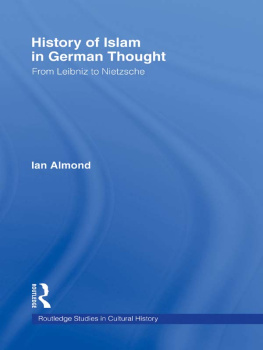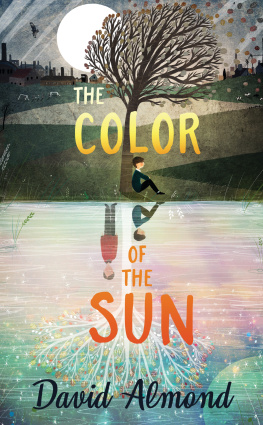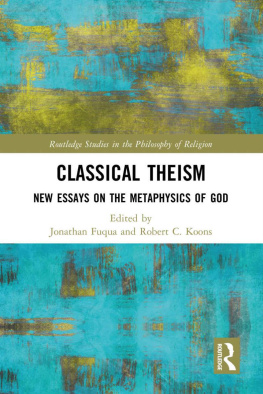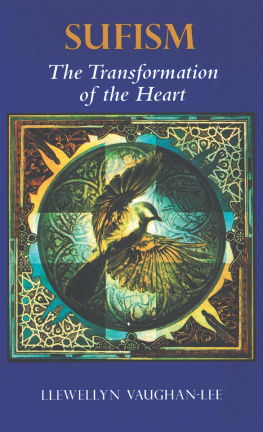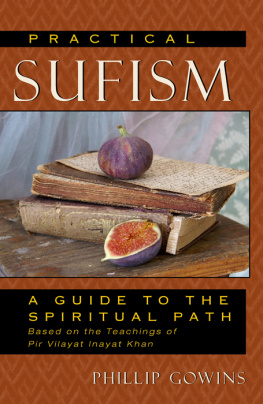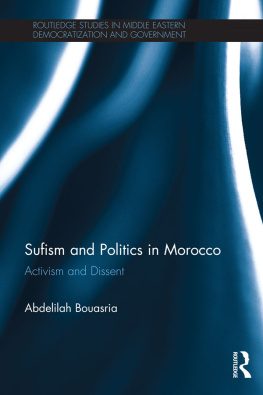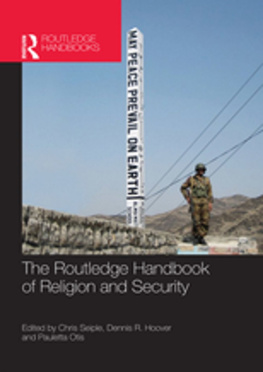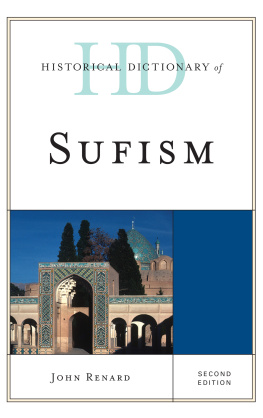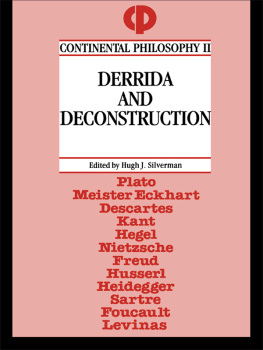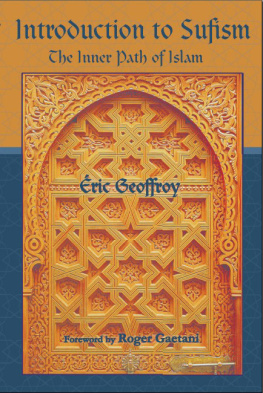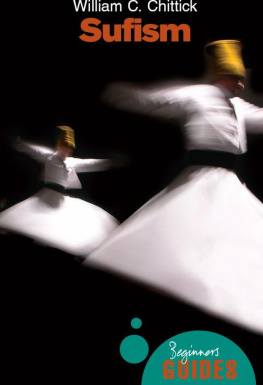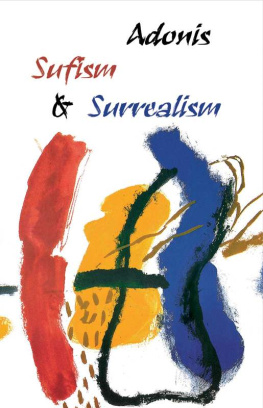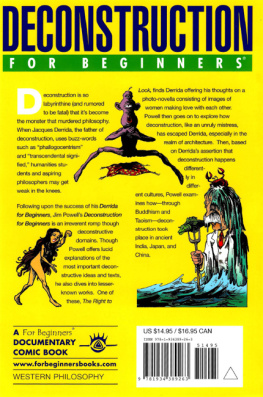Almond - Sufism and Deconstruction (Routledge Studies in Religion)
Here you can read online Almond - Sufism and Deconstruction (Routledge Studies in Religion) full text of the book (entire story) in english for free. Download pdf and epub, get meaning, cover and reviews about this ebook. year: 2004, publisher: Taylor and Francis, genre: Religion. Description of the work, (preface) as well as reviews are available. Best literature library LitArk.com created for fans of good reading and offers a wide selection of genres:
Romance novel
Science fiction
Adventure
Detective
Science
History
Home and family
Prose
Art
Politics
Computer
Non-fiction
Religion
Business
Children
Humor
Choose a favorite category and find really read worthwhile books. Enjoy immersion in the world of imagination, feel the emotions of the characters or learn something new for yourself, make an fascinating discovery.

Sufism and Deconstruction (Routledge Studies in Religion): summary, description and annotation
We offer to read an annotation, description, summary or preface (depends on what the author of the book "Sufism and Deconstruction (Routledge Studies in Religion)" wrote himself). If you haven't found the necessary information about the book — write in the comments, we will try to find it.
Sufism and Deconstruction (Routledge Studies in Religion) — read online for free the complete book (whole text) full work
Below is the text of the book, divided by pages. System saving the place of the last page read, allows you to conveniently read the book "Sufism and Deconstruction (Routledge Studies in Religion)" online for free, without having to search again every time where you left off. Put a bookmark, and you can go to the page where you finished reading at any time.
Font size:
Interval:
Bookmark:
What possible relationship can there be between a contemporary French postmodern thinker and a twelfth-century Sufi? How closely can Sufi oppositions to rationality in medieval Islamic thought resemble the contemporary, deconstructive resistance to reason and the Enlightenment project? How far is the medieval debate in Islamic tradition, concerning the extent to which we can talk truthfully and meaningfully about God, analogous to the postmodern debate of more recent times, concerning the extent to which we can talk truthfully and meaningfully about the world and the text?
This book provides a fascinating exploration of these questions by discussing a variety of common features in the vocabularies of two thinkers, Jacques Derrida and Ibn Arabi, situated almost eight centuries apart. These features include the opposition to systematizing representations of God/reality/the text; a re-emphasis on the radical unthinkability of God and the text; a common conception of rational thought as restrictive, commodifying and ultimately illusoryand a subsequent appraisal of confusion as leading to a higher state of knowledge; a positive belief in the infinite interpretability of the text; a suspicion of representationand an awareness of its semantic futility, along with a common, welcoming affirmation of openness and errancy towards God and the text.
This book will be essential reading for advanced students and academics of Religious Studies, Arabic and Islamic Studies and those interested in the work of Jacques Derrida and Ibn Arabi.
Ian Almond teaches English Literature at Bosphorus University, Istanbul, Turkey. He has published a wide variety of articles in a range of journals such as ELH, Modern Fiction Studies, The Harvard Theological Review, German Life and Letters , and New Literary History . This is his first book.
- Judaism and Collective Life
Self and community in the religious kibbutz
Aryei Fishman - Foucault, Christianity and Interfaith Dialogue
Henrique Pinto - Religious Conversion and Identity
The semiotic analysis of texts
Massimo Leone - Language, Desire, and Theology
A genealogy of the will to speak
Nolle Vahanian - Metaphysics and Transcedence
Arthur Gibson - Sufism and Deconstruction
A comparative study of Derrida and Ibn Arabi
Ian Almond - Christianity, Tolerance and Pluralism
Michael Jinkins - Negative Theology and Modern French Philosophy
Arthur Bradley

First published 2004
by Routledge
11 New Fetter Lane, London EC4P 4EE
Simultaneously published in the USA and Canada
by Routledge
29 West 35th Street, New York, NY 10001
Routledge is an imprint of the Taylor & Francis Group
This edition published in the Taylor & Francis e-Library, 2005.
To purchase your own copy of this or any of Taylor & Francis or Routledges collection of thousands of eBooks please go to www.eBookstore.tandf.co.uk.
2004 Ian Almond
All rights reserved. No part of this book may be reprinted or reproduced or utilised in any form or by any electronic, mechanical, or other means, now known or hereafter invented, including photocopying and recording, or in any information storage or retrieval system, without permission in writing from the publishers.
British Library Cataloguing in Publication Data
A catalogue record for this book is available from the British Library
Library of Congress Cataloging in Publication Data
A catalog record for this book has been requested
ISBN 0-203-69450-3 Master e-book ISBN
ISBN 0-203-67049-3 (Adobe eReader Format)
ISBN 0-415-32043-7 (Print Edition)
Arabic characters

A debt of gratitude should be acknowledged to the English translators of Ibn Arabi, in particular Ralph Austin and William G. Chittick, who have made the work of the Great Shaykh known so much more quickly in the Western world. Although I have frequently referred to the Arabic in my treatment of many passages from Ibn Arabi, I am certainly indebted to both Austin and Chitticks translations of these texts.
Thanks also goes to State University of New York Press for permission to reprint extracts from William G. Chitticks The Sufi Path of Knowledge: Ibn al-Arabis Metaphysics of Imagination (1989) and to Paulist Press of New Jersey for permission to reprint extracts from Ralph Austins The Bezels of Wisdom (1980), www.paulistpress.com.
I would also like to thank the research trust (Bogazii niversitesi Vakif ) at Bosphorus University, Istanbul, Turkey for their financial assistance and generosity. A number of their grants and awards have made the economic burden of my research much easier. Parts of chapters 2 and 3 have already been published in the Journal of the American Academy of Religion (Oxford University Press), vols. 70: 3 (2002) and 72: 1 (2004). Chapter 1 has appeared in Philosophy East and West 53: 1 (2003)reprinted here courtesy of Hawaii University Press.
At the time, one of them had claimed that the existentialist of all time had been Ibn Arabi whod not only been imitated seven centuries later but also been robbed blind by the Western world
Orhan Pamuk, The Black Book
Perhaps every history of ideas is nothing more than a careful documentation of clandestine theft. From Heraclitus and Augustine to Aquinas, precedents for existentialism are found almost daily, even though Pamuks long and extraordinary novel, it should be said, finds little sympathy with this practice. Parodying the familiar territorial instinct which, in many critics, seeks to re-appropriate vast sections of modern culture and whole centuries of thought on behalf of a single cultural source (invariably the critics own), Pamuk uses Ibn Arabi as an example of how certain Islamic/nationalist agendas in the East (for desperate want of a better term) have tried to lay claims to the foundations of the West. The Shaykhs alleged influence on Dantes Divina Commedia although Pamuk never mentions the scholar who first suggested this, Asin Palacios, by nameis cited as one example amongst many of such wishful hermeneutics.
Robbed blind or not, one thing is certain: Ibn Arabi is hot. In the 150 years since the first of Ibn Arabis works were printed in Europe, the body of critical interest in a thinker previously unknown to the West has grown exponentially. With a thriving Society, a plethora of critical studies and a quarterly Journal, Ibn Arabi (or the Shaykh al-akbar , the greatest master, as he is known in the Muslim world) has become associated with (to name but a few) quantum mechanics, Taoism, St Thomas Aquinas, Swedenborg, New Age mysticism, Kant and Chaos theory. With two central chapters dedicated to him in Routledges recent History of Islamic Philosophy , it appears that Muhyiddin Ibn Arabi (11651240) is finally joining the handful of token Easterners (Rumi, Averroes, Avicenna) known to non-experts in the West.
As often happens, this surge of popular Western attention in Ibn Arabi has also instigated a certain rearguard action amongst the more orthodox elements in Ibn Arabi scholarship. Thus a critic such as Mahmoud al-Ghorab can demonstrate, in twenty pages, how Ibn Arabi was neither a Shiite, nor a philosopher, nor an Ismaili, nor an esotericist, nor a figure especially sympathetic to Jews and Christians, but rather a Muslim and a Traditionalist (
Font size:
Interval:
Bookmark:
Similar books «Sufism and Deconstruction (Routledge Studies in Religion)»
Look at similar books to Sufism and Deconstruction (Routledge Studies in Religion). We have selected literature similar in name and meaning in the hope of providing readers with more options to find new, interesting, not yet read works.
Discussion, reviews of the book Sufism and Deconstruction (Routledge Studies in Religion) and just readers' own opinions. Leave your comments, write what you think about the work, its meaning or the main characters. Specify what exactly you liked and what you didn't like, and why you think so.

